













SA’S EQUITY STAKES


From policy to prosperity (or precarity?)




UNLOCKING CAPITAL FOR BLACK ENTREPRENEURS











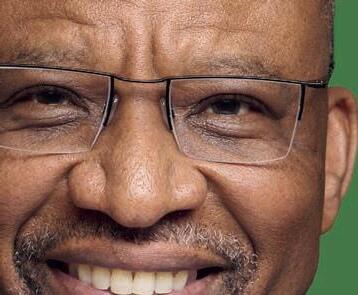





















From policy to prosperity (or precarity?)






























Does South Africa need a transformation reset?







BREAKING BARRIERS, BUILDING LEGACIES
Why gender balance is everyone’s business










A call for more courageous leadership, radical self-belief and transformation with purpose




















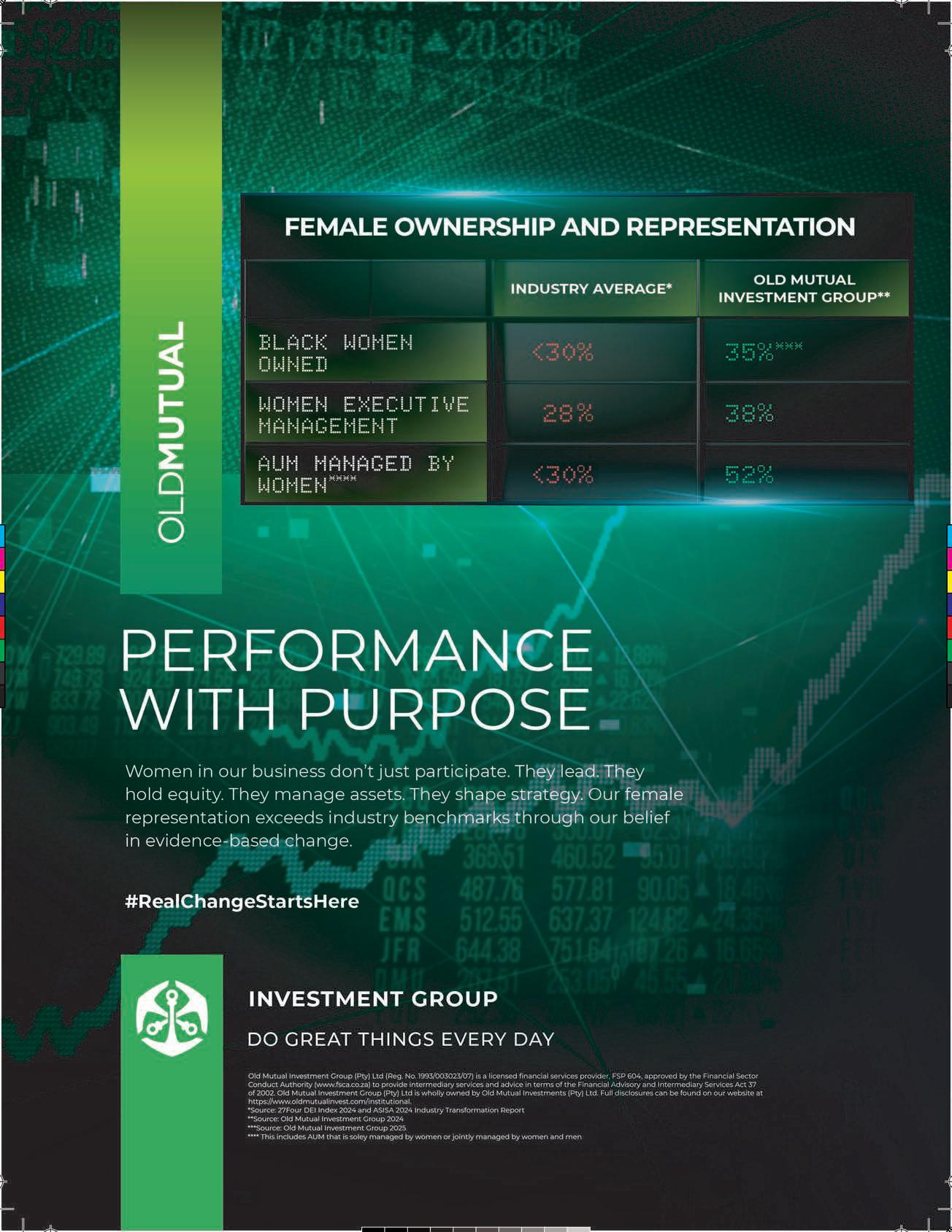

President: Mpho Motsei
Managing Director: Monde Ndlovu
BMF editorial team: Editor- Monde Ndlovu, Khulukazi Mtebele
Address: The Eric Mafuna House, 12 Summer Street, Rivonia, Sandton, Gauteng, 2196 www.bmfonline.co.za
Picasso Headline, a proud division of Arena Holdings (Pty) Ltd
Hill on Empire, 16 Empire Road (cnr Hillside Road), Parktown, Johannesburg, 2193
Postal Address: PO Box 12500, Mill Street, Cape Town, 8010
VAT Number: 4730261205
Contact Person: Lodewyk van der Walt
Tel: +27 21 469 2400 | Fax: +27 86 682 2926 www.businessmediamags.co.za
EDITORIAL
Content Manager: Raina Julies rainaj@picasso.co.za
Contributors: Siyabonga Hadebe, Wongiwe Ludidi, Lindiwe Matlali, Professor Mthunzi Mdwaba, Itumeleng Mogaki, Dr Khotso Mokhele
Copy Editor: Brenda Bryden
Content Co-ordinator: Natasha Maneveldt
Online Editor: Stacey Visser vissers@businessmediamags.co.za
DESIGN
Head of Design: Jayne Macé-Ferguson
Senior Designer: Mfundo Archie Ndzo
Cover Image: Supplied
SALES
Project Manager: Jerome van der Merwe jeromem@picasso.co.za
Tel: +27 21 469 2484 | 082 668 1496
Sales: Natasha Hendricks, Frank Simons
PRODUCTION
Production Editor: Shamiela Brenner
Advertising Co-ordinator: Shamiela Brenner
Subscriptions and Distribution: Fatima Dramat | fatimad@picasso.co.za
Printer: CTP Printers, Cape Town
MANAGEMENT
Management Accountant: Deidre Musha
Business Manager: Lodewyk van der Walt General Manager, Magazines: Jocelyne Bayer
Copyright: Picasso Headline. No portion of this magazine may be reproduced in any form without written consent of the publisher. The publisher is not responsible for unsolicited material. African Leader is published by Picasso Headline. The opinions expressed are not necessarily those of Picasso Headline. All advertisements/advertorials have been paid for and therefore do not carry any endorsement by the publisher.
2 MD’s note
Monde Ndlovu calls for radical, values-driven transformation in the GNU era.
3 President’s note
Mpho Motsei re ects on the BMF’s renewed commitment to equity, youth and black economic advancement.
4 FROM RECOGNITION TO REDRESS
Across the African continent, women anchor economies, steer innovation, and hold fractured communities together with uncompromising resolve.
5 BREAKING BARRIERS, BUILDING. LEGACIES
Why gender balance is everyone’s business.
6 In conversation with Daniel Mminele
In a powerful dialogue, BMF MD Monde Ndlovu sits down with Nedbank chair Daniel Mminele to unpack the realities of South Africa’s transformation journey – from policy fatigue and tokenism to authentic empowerment and sustainable growth.
10 Redefining empowerment: a new vision for black business
Professor Mthunzi Mdwaba outlines a transformative roadmap for inclusive economic growth.
11 SA’s equity stakes: from policy to prosperity (or precarity?)
Siyabonga Hadebe explores transformation progress and pitfalls in the labour market.


12 The funding gap: unlocking capital for black entrepreneurs
Industry leaders weigh in on scalable funding models and the policy shift needed to support black-owned businesses.
13 The future of work: Africa must build, not borrow
Lindiwe Matlali calls for digital self-determination and African-led innovation in the arti cial intelligence age.
16 Real ESG needs real transformation Dr Khotso Mokhele re ects on environmental, social and governance, equity and AECI’s journey toward inclusive sustainability.
18 Policy, power and purpose: inside the BMF’s defining moments
From the BMF Policy Conference and Achievement Awards, where bold ideas met national transformation, to the Berlin November Business Lounge, where young professionals reimagined heritage and entrepreneurship – 2025 has been a year of action. The George Negota Lecture honoured ethical leadership, while the Post-SONA Dialogue tackled economic fragility and the urgent need for sovereign strategy. These landmark events captured the BMF’s unwavering commitment to reshaping South Africa’s future.
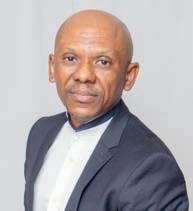
16 10 2

MONDE NDLOVU, managing director of the BMF, writes that transformation is not a project; it’s a way of thinking, leading and living, and that a quantum leap involving a deliberate set of actions will rede ne the intended outcomes
The Black Management Forum (BMF) has entered its 49th year of existence, proving its resilient, unyielding spirit for the cause of black professionals in the country. The organisation continues to use the African Leader magazine as its mouthpiece on leadership and transformation issues. In this issue, we explore the theme “Rethinking the Future of Socioeconomic Transformation”. The key point is that we must think more critically and profoundly about where we are as a country and where we need to go. A quantum leap is required, both in thought and implementation, especially under different political circumstances now known as the GNU context.
As we re ect on this, South Africa is readying itself for the G20 Summit. The international forum of 20 of the most powerful leaders will converge here to discuss the state of the global economy. I am reminded of the importance of looking outward as we introspect on our own economic woes. The G20 is lled with stories of countries that faced troubles worse than our own but managed to overcome, excel and serve as global case studies.
Germany emerged from both World Wars with war debt. Japan was in the same boat following the Second World War and South Korea following the Korean Wars. Indonesia faced a military coup in 1945 as did Argentina and Turkey in the 1960s. How did these countries, mired in violent con ict and economic and social disrepair, emerge victorious?
History tells us that a strong sense of patriotism and unity of purpose in all these countries allowed them to embrace industrialisation and innovation and leapfrog into the industrial and digital age with ease. Today, they stand as economic giants and testaments to the power of solidarity. It is my view that South Africa has the makings of such greatness. I also
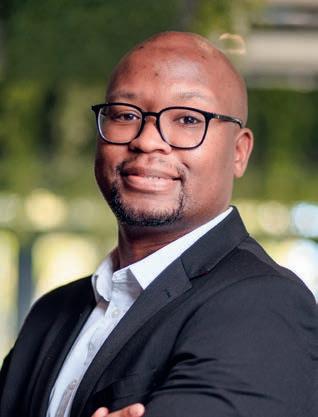
believe that when we were handed this democracy 31 years ago, it was not for democracy’s sake. It gave us the freedom to dream and realise those dreams, however, our mindset of lack and poor self-belief has held us back.
Until we, as black professionals, believe in our excellence and strive tirelessly to see that excellence realised in our education, work and leadership in our communities, we will not see full industrialisation. This is why the BMF continues to strive to entrench the belief of self-empowerment in its members and co-conspirators in the ght for transformation. Transformation requires intentional action in every sphere of our society. It is like a locomotive that needs fuel to keep the engine running and each of the wheels to work in unison and move in a singular direction to realise the transformation agenda.
We must reimagine transformation not just as a compliance exercise, but as a meaningful, measurable process that leads to economic inclusion and dignity for all. The broad-based black economic empowerment framework, while necessary, needs to be re-evaluated. Are we truly empowering people, or are we ticking boxes? Are ownership transactions bene tting communities and workers, or just a few? We must refocus on enterprise development, skills development and management control as areas that directly affect how opportunities are distributed. At the heart of this conversation lies leadership. Not leadership by title, but leadership by action. South Africa needs leaders who are willing to disrupt their comfort, challenge outdated systems and lead with clarity, courage and compassion. We need leaders who are present – not only in boardrooms and policy documents, but also in communities, mentoring the next generation and creating space for new voices to rise.
Leadership must also be forward-looking. We need agile minds, ethical hearts and a deep sense of service. That means investing in education and skills development relevant to the future. It means making space for young people to be employed and to innovate, own and lead.
As we make this leap, we must remain grounded in our values. Ubuntu as the driving belief in our shared humanity must anchor every decision we make. Transformation without values is empty. Leadership without empathy is dangerous. Let us build a South Africa where people matter more than pro ts, where empowerment is not elite-driven but community-centred and community-bound, and where justice is a lived reality.
We must think more critically and profoundly about where we are as a country and where we need to go. A quantum leap is required, both in thought and implementation.
The Black Management Forum president, MPHO MOTSEI, re ects on South Africa’s transformation journey, economic challenges and the forum’s renewed commitment to inclusion, equity, black excellence and empowerment
This is the rst publication of African Leader for 2025 and my rst as president of the Black Management Forum (BMF). There was a smooth transition into my role following the electoral conference in November 2024 and I am grateful to the past leadership for handing over the reins to an organisation that continues to thrive as it advocates for black excellence. Since embarking on this role, there has been much to re ect on and I am reminded that the road to transformation is an uphill one that we must walk with unwavering diligence.
The role of the Black Management Forum (BMF) was truly tried and tested in the rst quarter of the year and proved to be a turning point for us to renew our commitment to the transformation agenda. The year started with the budget saga, where for the rst time in our country’s history, the budget speech was postponed until March 2025. The VAT hike that followed caused considerable stir in the political ranks and society, generally. Economic growth this year was subdued, but somewhat improved from last year, and we were reminded of the cost-of-living crisis, the state of public debt and the dwindling opportunities for nancial emancipation that plague our society. Amid our economic woes, we saw the black economic agenda under attack from, not only domestic camps but international ones, too, reminding
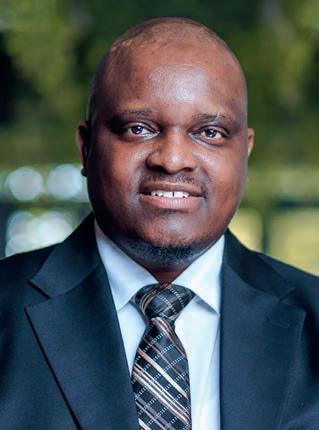
us of the challenges that befall us in creating an inclusive and sustainable economy where all South Africans can enjoy the country’s wealth. The black economic empowerment and commission employment equity reports as well as labour statistics evidence a persistent shortfall in black representation in the market. Much more must be done for the BMF’s advocacy efforts to translate into action that transforms our deeply unequal society.
Through our SMME, Women’s Desk and youth-driven chapters, we intend to address the marginalisation of women and youth from markets and
The road to transformation is an uphill one that we must walk with unwavering diligence.
ensure black people, generally, gain access to the markets they need to empower themselves. This is something BMF takes most seriously. When South Africa took up the G20 presidency, the BMF was deeply cognisant of our unique capacity to draw on our resilience in trying times and set a global example of people united even in diversity. The BMF is playing a leading role in advocating for solidarity, sustainability, and equality in the V20 and we see these values as central to transforming our country. This year, we renewed our commitment to nancial inclusion through various corporate agreements with Cash Crusaders, among others. We also concluded the long process of being recognised by the South African Quali cations Authority as a professional training provider. This is the start of a long-held dream by our leadership to see the development of a BMF Academy, which will produce black leaders who will forge a path of black excellence in our society.
We hosted several engagements where we advocated, educated and mobilised our members and partners towards creating a more equitable economy. We continued to contribute to government policy and hosted engagements to interrogate the Transformation Fund Concept Document released by the National Empowerment Fund. On 10 July, we will cement our long-standing and revered relationship with the B-BBEE Commission with a memorandum of understanding. Much has been achieved but much remains to be done. I am con dent in the BMF’s role to continue leading the way in transforming our society.
Across the African continent, women anchor economies, steer innovation and hold fractured communities together with uncompromising resolve. They are the traders in Accra’s markets, the coders building ntech platforms in Nairobi, and the smallholder farmers feeding families from the red soils of Senegal. Yet even as they carry nations on their backs, institutional power remains maddeningly elusive. KHULUKAZI MTEBELE marketing manager of the BMF, urges that we demand more than applause. We must demand redress – economic, political and structural
For over a decade, the gender gap in nancial inclusion has barely shifted. According to the World Bank, just 49 per cent of women in Sub-Saharan Africa held a formal nancial account in 2021, compared to 61 per cent of men. This is not a statistic; it is a verdict on the inertia of policy. Mobile money innovations have expanded access, yet women-led enterprises still capture less than 7 per cent of private capital, despite representing over half of self-employed activity and driving signi cant gross domestic product contributions. The African Development Bank estimates that bridging this nancing chasm could unlock up to $300-billion in economic value by 2025.
However, value does not speak for itself; it must be claimed. In Kenya, mobile money services enabled 66 per cent of women to open nancial accounts, lifting 2 per cent of female-headed households out of poverty. These gains prove that inclusion is possible, but only if digital equity accompanies nancial reform. Women in low- and middle-income countries remain 15–19 per cent less likely than men to access mobile internet and face a 13 per cent smartphone ownership gap. Without decisive intervention, innovation risks reinforcing exclusion rather than ending it.
In the political arena, the ceiling is glass and it is reinforced. Women occupy just 25.2 per cent of parliamentary seats across Sub-Saharan Africa. Even with Rwanda’s impressive 61.3 per cent female representation,
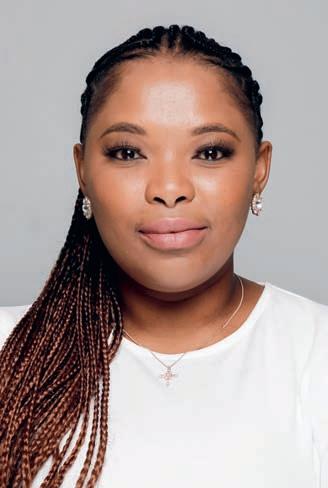
the continental average signals stagnation. Icons like Ellen Johnson Sirleaf, Sahle-Work Zewde and Ngozi Okonjo-Iweala show what is possible. However, representation cannot rely on exceptionalism.
Every parliamentary chamber that sidelines women is a theatre of incomplete democracy. Financial inclusion is not just an economic issue; it underwrites the capacity to run for of ce, in uence budgets and demand accountability. Yet too often, peace negotiations and public policy forums exclude the very women who hold communities together. Events like UN Women’s 2025 Africa Strategy dialogues promote quotas and mentorships, but talk must be matched with institutional obligation. The Black Management
Forum, for its part, must go further: advocating for corporate gender parity laws, publishing equity scorecards, and mobilising business leaders to dismantle exclusionary practices from boardrooms to ballot boxes.
One in four girls in Sub-Saharan Africa misses school each month due to a lack of sanitary products. This is not a cultural oversight; it is policy failure. Meanwhile, 33 per cent of women experience gender-based violence (GBV), a gure rooted not in tradition, but in the systemic erosion of state protection. Such violations are not peripheral issues; they are structural saboteurs of economic growth and social stability.
Redress requires budgets, not slogans. It demands safe infrastructure, accountable institutions and policies that treat menstrual health and GBV as civic priorities, not side issues. Until then, women remain consigned to navigate systems that were never built with them in mind.
This is not charity. Nor is it symbolic recognition. It is a continental imperative: to legislate equity, nance agency and institutionalise care. When African women lead, they do not merely uplift households; they rede ne the nation-state. The question is not whether they are ready. It is whether our systems have the moral courage to follow.
The path from recognition to redress is clear. Now it must be walked with urgency, not ritual.
True transformation demands inclusive leadership. CHEP’s senior manager for talent, learning and culture in sub-Saharan Africa, WONGIWE LUDIDI, shares why gender equity isn’t just about representation; it’s a business necessity with long-term impact for all
For too long, gender equality has been boxed in as a “women’s issue”. However, the data and experience tell a different story. Gender balance is no longer just about fairness. It’s a business imperative and a powerful lever for innovation, performance and growth. At CHEP, we see gender equity as a legacy worth building – one that opens opportunity for all and creates resilient, high-performing organisations.
The World Economic Forum’s Global Gender Gap Report 2024 offers a sobering reality check. While 68.5 per cent of the global gender gap has been closed, at the current rate, gender parity is still 134 years away. That’s not just a missed moral opportunity; it’s an economic one. Gender-diverse teams outperform their peers, and McKinsey research shows that companies with over 30 per cent women in leadership consistently achieve stronger nancial results. The takeaway? Equity is not just right; it’s smart business.
Yet, across sectors, women remain under-represented in technical and operational roles. In male-dominated elds like supply chain and logistics, the pace of transformation must accelerate. It’s time to move from rhetoric to action, embedding inclusion across systems, policies and leadership cultures.
At CHEP, we recognise that gender balance is not just a goal, but a strategic priority that strengthens our operations and helps us build a more resilient workforce. Our efforts go beyond rhetoric; they are embedded in our hiring, training and leadership development programmes.
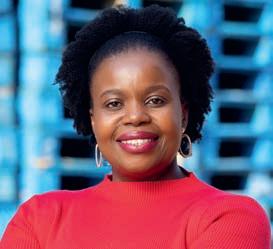
1. Trailblazing in technical roles
The logistics and supply chain industries have traditionally been male-dominated, particularly in technical roles. Challenging this norm is the appointment of our rst female logger driver – a specialised role in timber handling and sawmilling. This milestone recognises our efforts towards increasing women’s representation in technical roles, aligning with our parent company, Brambles’ target of having 12 per cent women in our service centres.
2. Developing women in supply chain
The operational space presents unique challenges for women, from managing large teams to navigating traditionally male-dominated environments. To address these challenges, we launched the Women in Supply Chain Development Programme, which equips female employees with technical and leadership skills. Currently, seven women are on this journey, preparing to take on future leadership roles in our operations.
3. Investing in the next generation of women leaders
We believe long-term change starts with nurturing young talent. Since 2020, our Graduate Development Programme has focused on providing opportunities for women across various business functions.
1.Equity is an economic advantage Gender-diverse teams lead to better decision-making and stronger financial performance, proving equity is not just moral; it’s strategic.
2.Break silos with targeted investment. From leadership programmes to technical roles, investing in women across all levels creates stronger pipelines and more resilient organisations.
3. Inclusion requires everyone. Gender balance isn’t just for women to champion. Men must step up as allies, mentors and change-makers for lasting transformation.
Now in its fth year, the programme has supported nine young women, helping them gain industry experience and positioning them for leadership roles within CHEP. This initiative strengthens our leadership pipeline while advancing our broader diversity, equity and inclusion ambitions.
Gender equity isn’t about giving women an upper hand. It’s about creating systems where talent can thrive, regardless of gender. For this to succeed, men must also be active allies, championing equity, mentoring future leaders and reshaping corporate cultures. Inclusion is not just a women’s issue; it’s a societal and business necessity.
At CHEP, we are building a legacy of inclusion. This is not a one-off project, but a sustained commitment to better business and a more equitable world because when all voices are heard, all businesses rise.
The Black Management Forum’s managing director, MONDE NDLOVU, sits down with Nedbank chair Daniel Mminele to tackle the big question: are transformation policies working, or does South Africa need a reset?

At a recent dialogue hosted at Nedbank’s headquarters, Daniel Mminele, Chair of the Nedbank Group, shared thoughtful perspectives on the ongoing transformation journey in South Africa with BMF Managing Director Monde Ndlovu. As part of The African Leader Magazine’s special focus on socioeconomic change, Mminele highlighted the value of pausing to reflect—celebrating progress,
acknowledging ongoing challenges, and considering where attention is still needed. For Mminele, the transformation conversation extends beyond policy checklists; it’s about shaping a future where opportunity, inclusion, and cohesion define South African society. Mminele opened with a call for national introspection: “We need to go back to what transformation, more broadly, more holistically means.” Too often, he noted, South Africa’s transformation
narrative becomes trapped in the narrow confines of race and gender representation, sidelining the original vision of a more holistic and integrated restructuring the entire fabric of society. To him, transformation goes well beyond compliance; “It’s about how we, based on our unique history and socio-political context, redefine the norms, practices, and values that govern our society to ensure growth and development and lasting stability and cohesion.”
Looking back on the last thirty years, Mminele believes South Africa’s most notable achievement was political transformation. “We secured much more inclusive representation in governance— everyone got a seat at the table, which has been a big win.” He described the post-1994 expansion of rights and participation as “a key foundation on which other forms of transformation were supposed to be built.”
Economic inclusion, however, presents a more nuanced picture. Mminele pointed to successes in the financial sector, singling out the Financial Sector Charter and initiatives on financial inclusion and the financing of empowerment transactions. “We mustn’t underplay the progress made, such as broadening access to finance and supporting empowerment deals,” he maintained. But the Chair also acknowledged major shortfalls. “We have not sufficiently shifted representation at the highest levels—especially for black Africans and for women in senior leadership roles. There’s a pipeline problem that needs fixing.” Cautioning against hand-waving or self-congratulation, he added, “We must be honest about where we’re still falling short. Real transformation is still patchy at the top.”
Where have things gone awry?
According to Mminele, some wellconceived policies failed due to poor execution. “Social transformation strategies weren’t executed as well as they could have been. Sometimes, these efforts weren’t broad enough to reach more people. Too often, they benefited politically connected elites or were derailed by nepotism and corruption.” Such missteps, he warned, give transformation a ‘bad name’ and risk public cynicism. Yet he stressed the need for balance with regard to the current debates around BEE: “While we need to push back against those that seek to exploit instances of sub-standard implementation to throw the baby out with the bath water, and defend BEE as
“We’ve got to stop treating transformation’s financial implications as a mere expense. It’s an investment in societal stability, which, over time, pays off through growth, innovation and resilience.”
a justified moral, business and strategic imperative, such defense becomes easier if we do not ourselves create platforms of attack. For that we need to ensure best practice execution, avoid nepotism and tokenism, promote processes that are free of corruption and mismanagement, and at all times be able to demonstrate value-add and impact.”
A recurring question in the transformation debate is whether efforts to diversify leadership threaten institutional stability. Mminele is unequivocal: “There’s no real trade-off between institutional stability and transformation. These two are not mutually exclusive—they go hand in hand.”
He elaborated, “The idea that transforming leadership means destabilising organisations is misguided. What matters is the quality and integrity of implementation. We must avoid shortcuts, resist the temptation of token appointments, and ensure the transformation is genuine and sustainable.” For him, the real risks to organisational stability arise when appointments are made for box-ticking purposes without real authority or support for incumbents. “Friction arises when it’s unclear who has the real power when leaders are put forward as the face of transformation but lack actual influence. That’s when you create tension and potential dissonance inside organisations.”
Mminele urged organisations to adopt a long-term perspective. “If you approach transformation as a strategic, long-term investment rather than a compliance checklist, everything changes. It’s similar to saying you lose money by pursuing
“There’s no real trade-off between institutional stability and transformation. These two are not mutually exclusive; they go hand in hand.”
environmentally responsible practices— that’s only true if you don’t believe in the long-term imperative.”
He advocated for what he called a “planting mindset.” Transformation, he explained, is “about putting in the work now, investing in people, and preparing for future returns. The immediate costs should be seen as investments—costs you plant today to harvest tomorrow. Short-termism and headline-chasing, on the other hand, only undermine the journey.”
Mminele also addressed the “cost” narrative often accompanying transformation efforts in public discourse. “We’ve got to stop treating transformation’s financial implications as a mere expense. It’s an investment in societal stability, which, over time, pays off through growth, innovation, and resilience.”
A key concern voiced by Ndlovu—and backed by the Black Management Forum’s advocacy—is the persistence of tokenism at senior levels. Too often, empowered positions are created in name only, with little real authority. Mminele’s response was pragmatic but unsparing: “The reality is mixed—there are both genuine empowerment stories and mere window dressing. Institutions must be honest about what they’re doing, and individuals, too, must reflect on whether they’re grasping the full responsibilities of leadership.”
Mminele does not accept a narrative that black executives are often tokens. “We have examples of black leaders who have been given real power and made a difference, so it’s not universal. But where organisations are obsessed with quick compliance or external optics, the danger of tokenism is real.” He also called out a tendency among some professionals to accept the title without demanding the
authority: “We need to ask ourselves, am I just here for a title and money, or am I driving real impact?”
He also tackled the supply side of transformation—the readiness of aspiring leaders. “Technical skills are the ticket to the game, but leadership requires a lot more. Not everyone who is technically competent is ready to lead, and that’s okay.” True leadership, in his words, “demands integrity, honesty, trustworthiness, a collaborative mindset, and the ability and willingness to grow others.”
Organisations should be as focused on developing these qualities as they are on counting numbers and degrees.
Mminele walks the talk. Developing a robust leadership pipeline is one of Nedbank’s priorities. “We are the largest participant in the Youth Employment Service (YES) Scheme, providing meaningful internships for unemployed youth, and we train quantitative analysts and future chartered accountants, and develop future leaders. Real-world experience is critical. A degree alone won’t prepare you for the top.” He pointed out that, globally, banks are starting to value a wider range of educational backgrounds, seeking problemsolvers and critical thinkers, not just technical experts.
Skills shortages, particularly in STEM disciplines, are another major barrier.
“South Africa’s struggle in maths and science limits entry to key industries,” Mminele pointed out, but he urged employers to keep an open mind.
“Skills can be taught, and what matters is a candidate’s ability to learn and adapt. We must not be bound by rigid notions of what makes a good leader.”
He concluded this theme by advocating for openness and peer learning among aspiring leaders.
“Network, share experiences, and seek mentorship from those who have succeeded. Let’s not frame these issues as insurmountable, but as challenges we can overcome together.”

“Public and private collaboration must help create jobs, curtail inequality and reduce unemployment.”
Mminele’s experience leading the Presidential Climate Finance Task Team, which launched the innovative Just Energy Transition Partnership (JETP), reinforced his belief that true transformation must be holistic and forward-thinking. “The JETP wasn’t just about reducing emissions—it was an effort to connect climate policy with job creation, poverty alleviation, and community development. We cannot transform sectors or society in isolation.”
He explained, “Energy transition in South Africa isn’t just technical; it’s deeply social. We had to consider communities dependent on fossil fuels, look at how to develop new skills, and create value chains for the renewable economy.” In his view, transformation efforts that lack integration or fail to consider their social impacts will not stick. “Genuine transformation always places people and long-term societal health at the centre.”
As for institutional mandates, Mminele emphasised the need for continuous
“Genuine transformation always places people and long-term societal health at the centre.”
adaptation. “Institutional mandates must evolve. Mandates should speak to financial inclusion, broad participation, and the common good.” He believes Nedbank is on the right track: “Transformation is embedded in our purpose. We want to use our financial expertise to do good for individuals, families, businesses, and society.”
For Mminele, transformation is not a destination. “It’s a journey, building on the work of previous generations and adapting as needs change. Our job is to ensure that, decades from now, people will see genuine progress—a more inclusive, sustainable, and prosperous society.” He agrees with the analogy of building a cathedral, where every generation adds a stone. “Our legacy will be judged by whether we moved the project forward or left it stagnant.”
He ends on a decisive note: “Everything stands and falls on reigniting higher levels of growth in this economy. Public and private collaboration must help create jobs, reduce inequality, and reduce unemployment. Let’s put our shoulders to the wheel and redouble our efforts. Transformation, empowerment, and social cohesion will follow if we achieve strong and sustainable economic growth. That’s our real mission.”

EXCELLENCE THROUGH INCLUSION | STRENGTH THROUGH DIVERSITY









The accolade is awarded to companies that dare to challenge the status quo and transform communities. WE ARE PROUD OF THIS ACHIEVEMENT AS WE CELEBRATE LEADING WITH COURAGE, BREAKING BARRIERS, AND REDEFINING WHAT IS POSSIBLE

“BBBEE is not just a regulatory requirement, but a fundamental business imperative that drives our success and sustainability.
Winning the Company of the Year Award demonstrates our commitment to fostering an inclusive economy and creating opportunities for growth and development. This commitment is reflected in our diverse workforce, equitable procurement practices, and community upliftment initiatives.”
The
The
Neville Brink, Oceana Group: CEO
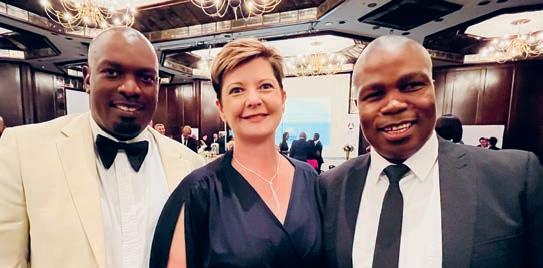




Oceana Group: CEO
Oceana Group: CEO
South Africa’s path to economic transformation demands more than policy tweaks; it calls for a bold reimagining of black economic empowerment, writes PROFESSOR MTHUNZI MDWABA, chairman and CEO of TZoro Global Advisory and chairman of KasiKonnect
South Africa faces signi cant socioeconomic challenges that form the backdrop for any discussion on black business ownership. These include high unemployment and poverty rates, some of the world’s worst inequality as measured by the Gini coef cient, low total factor productivity and poor competitiveness rankings, according to the Institute for Management Development. These are the realities that cannot be ignored when discussing the future of black-owned enterprises.
Despite criticism from international bodies such as the IMF and World Bank, black economic empowerment should be maintained but substantially re ned as its application has largely failed to achieve meaningful transformation. The focus must shift beyond individual enrichment toward broader community and societal transformation. True sustainability for black business ownership will only emerge through genuine inclusivity that eliminates marginalisation. When economic impact reaches all segments of society, we can speak con dently about a sustainable future for black business ownership.
The disconnect between economic rhetoric and reality is painfully evident to many aspiring black entrepreneurs. These young, capable individuals consistently express frustration about an economy they hear discussed, but cannot access due to a lack of enablement, skills de cits, resource constraints and nancial barriers. Many perceive that opportunities are predetermined, with public advertisements serving merely as formalities rather than genuine openings for new participants.
Sustainable black business development is linked inextricably to inclusive economic growth. Within a transformation
framework, inclusive growth necessitates the creation of an equitable distribution of resources where everyone participates. It demands sustainable job creation, reduced inequality and improved living standards, particularly for marginalised communities. Dignity for all must become our collective rallying cry, with emphasis on decent work, fair wages, safe working environments and social protection.
Investment in human capital is crucial, encompassing education, healthcare, and skills development. We must abandon colonial-inherited attitudes of disrespect and embrace collaborative models that keep nancial resources circulating within our communities, similar to practices observed in Jewish and Muslim communities.
Understanding how to work within economic ecosystems and adopting a developmental mindset will stimulate growth by emulating successful models.
Policy development should prioritise small and medium enterprises, the informal sector and township economies to ensure sustainable development. Black business leadership must recognise that sustainable growth requires developing the informal sector, which comprises over 65 per cent of the economic landscape, rather than competing in the 35 per cent “Red Sea” controlled by white monopoly capital and JSE-listed companies. Youth entrepreneurship and sector-speci c innovation policies must be implemented in conjunction with responsible land reform that addresses rural and peri-urban challenges while ensuring impactful commercialisation and sustainable value chains.
The business community must demonstrate courage in confronting
corruption and illicit nancial ows, ensuring they do not perpetuate vicious cycles of exploitation. Intentional and courageous disruption for inclusivity is necessary, embracing diversity in all its dimensions.
South Africa must strategically leverage shifting global power dynamics, aligning with formations like BRICS Plus while positioning itself as a catalyst for an African economic development revolution.
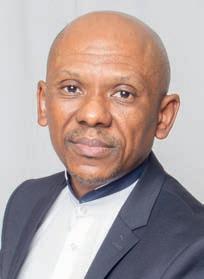
To achieve a sustainable future where black business owners become masters of their destiny, unity and mutual respect are essential. The business community must appreciate each other’s talents without jealousy of individual successes, recognising that collective strength emerges from shared achievements. Black business owners must practice conscientious capitalism, rooted in African traditions, that ensures collective community resourcing.
This approach creates the foundation for meaningful African change in collaboration with diverse stakeholders. The future of black-owned businesses need not remain an elusive target when built upon the correct foundation of inclusive economic growth. With proper implementation, this transformation will unfold organically and naturally, creating sustainable prosperity that extends beyond individual business owners to bene t communities and the nation as a whole.
Follow: Mthunzi Mdwaba @ www.linkedin.com/in/mthunzi-mdwaba-b8045830
Transformation must be re ned and pursued relentlessly to deliver real improvements in wages, livelihoods and opportunities, ensuring an inclusive and empowered future for all South Africans. By labour market expert SIYABONGA HADEBE
South Africa faces a critical moment in its socioeconomic transformation, highlighted by the DA’s High Court challenge to the Employment Equity Amendment Act. This legal battle, echoing global trends such as the rollback of diversity and inclusion policies in the United States under President Trump, shows that true transformation demands more than just legislation; it must be actively protected, improved and assessed by its real, inclusive impact.
Since the dawn of democracy, South Africa has seen labour reform as crucial for equity and socioeconomic transformation. Yet, the triple challenge of poverty, inequality and unemployment continues to rise. Thirty years on, the labour market remains one of the most stubbornly unequal sectors in society. The 2024 Commission for Employment Equity report found that white workers, 7.3 per cent of the population, hold 62.1 per cent of top management roles. Meanwhile, unemployment hovers around 32 per cent, excluding those discouraged from actively seeking formal employment.
As South Africa grapples with youth unemployment, poverty and wage disparities, we must ask: Have transformation policies delivered real socioeconomic bene ts, or are they mere box-ticking exercises?
The answer is not a simple yes or no. It is a complex narrative of gains, persistent gaps and a renewed opportunity for impact. Despite pushbacks accusing transformation of “reverse racism”, the
evidence shows measurable progress.
Black South Africans occupy a signi cant majority of professionally quali ed and skilled positions, a notable increase over the last two decades. Similarly, female representation in senior roles has been rising since the early 2000s.
These are signi cant strides, re ecting shifts in hiring practices and growing boardroom awareness. However, representation does not guarantee inclusion or impact. Wage equity remains elusive: a 2022 PwC study found that black professionals earn 23 per cent less than their white peers in comparable roles and make up only 15 per cent of executives in sectors such as ICT and nance. This “glass ceiling” cannot be broken by numbers alone.
Public perception about transformation is sceptical. Many view transformation policies as elite-centred or poorly enforced. Black-owned small, medium and micro enterprises (SMMEs) face challenges accessing procurement opportunities and navigating the complex broad-based black economic empowerment (B-BBEE) compliance requirements. Many black youths face limited pathways into sectors demanding prior experience, which they often lack.
Still, hope exists. The recently launched R100-billion Transformation Fund targets nancial aid, training and market access for SMMEs owned by women, youth and people with disabilities in townships and rural areas. However, economist Stuart Theobald warns that it might become another “pipeline for enrichment” rather than empowerment, a cautionary echo of past B-BBEE failures.
Transformation fatigue is real, but it must not result in retreat. Instead, it should spark reform.
Transformation must move beyond compliance to outcomes. The amended Employment Equity Act encourages a focus on implementation, but targets alone won’t suf ce. South Africa needs transparent equity audits, ongoing wage equity tracking and indicators that assess workplace culture, career mobility and genuine economic empowerment. Transformation fatigue is real, but it must not result in retreat. Instead, it should spark reform. South Africa’s digital transition presents a new opportunity to embed equity. Microsoft SA’s R1.3-billion digital skills programme for black SMMEs demonstrates the private sector’s potential when equity goals are embraced.
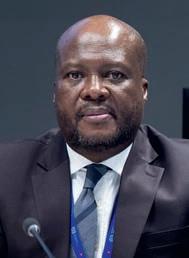
Minister Solly Malatsi’s Equity Equivalent Investment Programmes policy aims to enhance ICT investment and broadband by offering ownership alternatives, aligning with South Africa’s connectivity objectives. However, critics worry that allowing companies like Starlink to bypass transformation rules could undermine progress.
In response, COSATU demands that B-BBEE genuinely empower workers, prioritising employee share schemes and local goods over merely “deracialising the bourgeoisie”. This stance is crucial, as the digital economy risks deepening structural exclusion by pushing many black workers into a “precariat” class once again.
South Africa would bene t from studying the European Union’s approach to the digital economy, particularly in terms of worker classi cation, social protections and algorithmic management.
ITUMELENG MOGAKI speaks to industry leaders to unpack nancial barriers facing black-owned businesses and the innovative funding solutions helping to close the gap
Despite South Africa’s efforts to support economic transformation through laws like the Broad-based Black Economic Empowerment (B-BBEE) Act, black entrepreneurs still face signi cant challenges in securing funding, especially after the start-up stage.
Tshego Sefolo, CEO of private equity rm Agile Capital, explains that while funding is available in the market, it tends to favour more mature businesses. “Start-up capital, in particular, is dif cult to come by due to investors’ risk-averse nature.” Agile Capital focuses on investing in sustainable businesses with strong leadership, solid nancial track records and clear growth.

Sefolo notes that this risk aversion is particularly problematic for black entrepreneurs, who face additional hurdles, including limited access to networks, fundraising expertise and other critical support mechanisms necessary for launching and growing a business.
Reneilwe Ntshwarang, senior specialist in ecosystem banking and corporate funds management at Absa Corporate and Investment Banking (CIB), says the main issues affecting small businesses and black-owned businesses include access to affordable nance, markets and capacity building.
Agile Capital takes a distinctive approach by evaluating businesses not only on nancial fundamentals like returns, growth prospects and cash ow, but also on the company’s “right to win”, says Sefolo, explaining that: “We look for more than just a great concept. We aim to explore how this concept can be translated into a sustainable business with genuine market potential.
This emphasis on commercialisation and scalability aims to ensure investments create lasting value.”
Absa employs an ecosystem approach to offer inclusive nancing to black entrepreneurs and small businesses, particularly those connected to corporate value chains. Ntshwarang says they focus on helping small, medium and micro enterprises grow by offering cash ow-based loans that don’t require collateral or a history of past performance. “Absa also works with partners to reduce risks and offers lower prices in some markets to make nancing more affordable.”
Absa’s support also extends beyond funding. The bank has a dedicated corporate funds management team that helps corporates achieve their enterprise and supplier development goals. “This means we get to unlock more nancing to small and medium enterprises that are more than fty-one per cent black-owned. Alongside this, Absa’s growth capital solutions team focuses on ownership transactions and B-BBEE nancing to create and support black industrialists.”
To boost economic participation, Sefolo says corporate South Africa must do more, especially through environmental, social and governance funding. “When big companies fund and support promising black-owned suppliers, these businesses grow, create jobs and expand beyond initial contracts.”
Sefolo and Ntshwarang agree that, while South Africa has policies in place to support black businesses, weak implementation is a signi cant issue.
“Too often, compliance is just a box-ticking exercise rather than a real

Find out how Absa provides entrepreneurs and small business owners with business development services to start and grow their businesses.
push for inclusive growth,” says Sefolo, who believes enterprise development under B-BBEE is a missed opportunity for real impact.
Ntshwarang says that using average balances instead of closing balances to claim B-BBEE points could better re ect ongoing support. “There must be a need to formalise localisation efforts and improve tracking and reporting to drive broader nancial inclusion across Africa.”
Unlocking capital for black entrepreneurs will require a co-ordinated effort across the public and private sectors.
From rethinking risk in early-stage investments to reimagining corporate supplier strategies and adopting innovative funding models, including blended nance instruments and public-private partnerships, the path to an inclusive economy depends on enabling access to capital backed by real support.

Absa and Agile Capital’s approaches illustrate that unlocking capital for black entrepreneurs is not only about funding, but also about creating ecosystems that support sustainable growth, strategic partnerships and effective policy implementation. Only through such integrated efforts can South Africa bridge the funding gap and unlock meaningful economic transformation.
Follow: Tshego Sefolo @ www.linkedin.com/in/tshego-sefolo-357ba336 Reneilwe Ntshwarang @ www.linkedin.com/in/reneilwentshwarang
The future of work must be African, and it must belong to all of us. By LINDIWE
MATLALI
, founder and CEO of Swerfvalk, a defence deep-tech start-up
As the world rushes headlong into an era dominated by arti cial intelligence (AI) and automation, decisions made in distant boardrooms, whether in Silicon Valley, Berlin or Shenzhen, are quietly yet fundamentally redrawing the contours of global industry, opportunity and power. A silent revolution is underway: algorithms are beginning to make choices once reserved for humans and machines are taking on tasks our parents would never have entrusted to anything but human hands. Amid this swift transformation, the pivotal question is not merely whether we will adapt to change but who will shape its next chapter.
Africa today faces a historic crossroads – one that isn’t just about keeping pace with global trends, but about moving with intention, resilience and ownership. Now more than ever, we cannot afford to be spectators in the unfolding future of work.
Africa’s advantage is clear. Our continent boasts the world’s youngest population – a wealth of untapped human potential. This demographic dividend, if harnessed with vision, could position Africa as a wellspring of engineers, data scientists, innovators and leaders who will de ne what comes next. However, this same demographic strength carries risk. If we fail to equip our youth with the necessary tools and pathways for modern work, we risk producing a generation sidelined by technological progress; bystanders in a game they could have led.
Across advanced economies, the future of work is no longer theoretical; it is being operationalised through bold,
forward-thinking policies and investments. Singapore’s SkillsFuture initiative serves as a model for lifelong learning at a national scale, empowering every citizen to update their expertise continually. Germany has shown how apprenticeships can evolve, embedding digital uency into the very fabric of skilled trades. In the United States, corporate giants like Amazon are investing billions to endow their workforce with AI competencies, recognising that prosperity hinges on building human capital suited for tomorrow’s work.
These economies no longer debate the inevitability of automation; they debate how best to thrive within it.
In contrast, much of the African conversation still grapples with foundational challenges, including access to quality education, affordable connectivity and basic digital infrastructure. This persistent preoccupation puts us at a dangerous crossroads. There is a real risk that Africa, instead of being a co-creator of innovation, will become simply a consumer of other regions’ breakthroughs – a taker, not a maker – in the future economy.
Africa’s leapfrog moment cannot, and should not, be a matter of mimicry. We will not build a prosperous and inclusive future by copying solutions from the Global North. Instead, we must develop bold models attuned to our context and ambitions.
It is time to integrate digital literacy and AI pro ciency at the DNA level of organisational strategy. One-off corporate
social investment projects are necessary, but insuf cient. Digital upskilling must become a central pillar of how we hire, train and accelerate African talent, especially black professionals, into emerging roles.

Inclusion is not an act of charity; it is a business imperative. Companies must intentionally accelerate diverse professionals into high-impact, high-demand roles. Representation fuels innovation, breeds resilience and forti es Africa’s competitive edge. Leaders must understand that diversity is their runway to relevance in global markets. Perhaps most crucially, Africa must own its future by owning its innovation. Reliance on imported AI models and foreign software will always keep us one step behind. Investing in homegrown start-ups, nurturing local deep-tech ecosystems and ensuring African ownership of intellectual property is non-negotiable if we wish to secure sovereignty over our digital destiny.
To truly lead, we must transcend sympathy and slogans, replacing them with access, actionable opportunities and authentic advocacy. Inclusive employment is no longer an extracurricular luxury; it is foundational to peace, prosperity and relevance in the age of arti cial intelligence. The future of work must be African, and it must belong to all of us.
Digital upskilling must become a central pillar of how we hire, train and accelerate African talent, especially black professionals, into emerging roles.
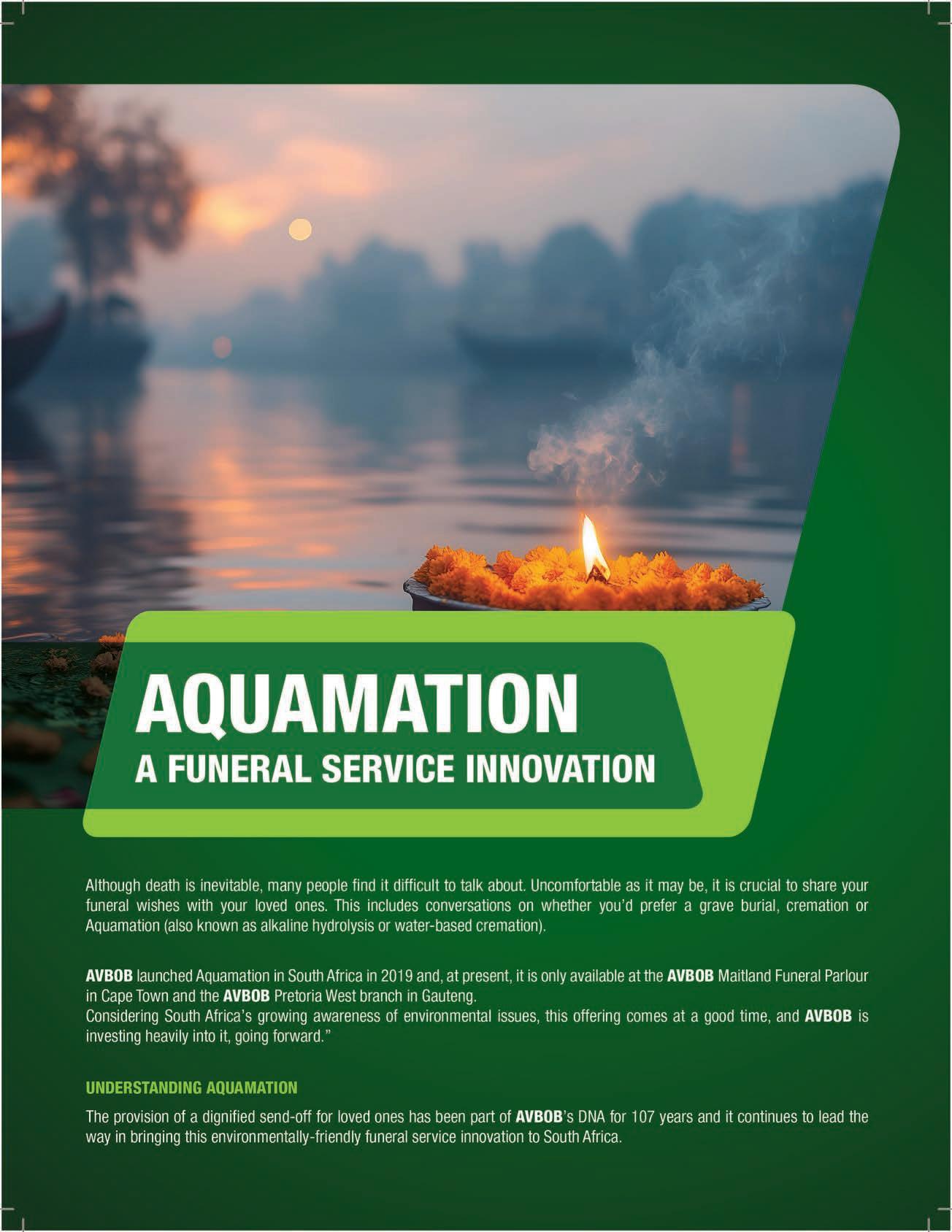

Dr KHOTSO MOKHELE steps down after nine years as the chairperson of the AECI board, he re ects on why ESG must champion transformation to move beyond performative acts toward tangible, equitable societal progress
As I re ect on my tenure as chairperson of AECI, I do so not with nality, but with the hope that the work we have done and the principles we have upheld will shape the direction of our future. In this de ning moment, as we close a remarkable chapter in AECI’s centenary history, one question stands above all others: what kind of world are we building and for whom?
This question sits at the heart of a growing global conversation around environmental, social and governance (ESG) policies and how they intersect with the urgent, un nished work of transformation in South Africa and beyond.
It is a conversation we must confront with honesty, humility and resolve.
Too often, ESG and transformation are treated as separate tracks – one concerned with climate, compliance and risk; the other with inclusion, access and redress – but to silo these concepts is to misunderstand them fundamentally.
Both ESG and transformation are about sustainability. Both concepts are centred on justice, encompassing environmental justice, economic justice and intergenerational justice. Both demand that we move beyond performative metrics to meaningful, measurable impact.
We must stop asking whether ESG includes transformation and start understanding that a sustainability agenda without transformation is fundamentally incomplete. An environmentally “green” company that is not also socially and economically inclusive cannot truly claim to be sustainable.
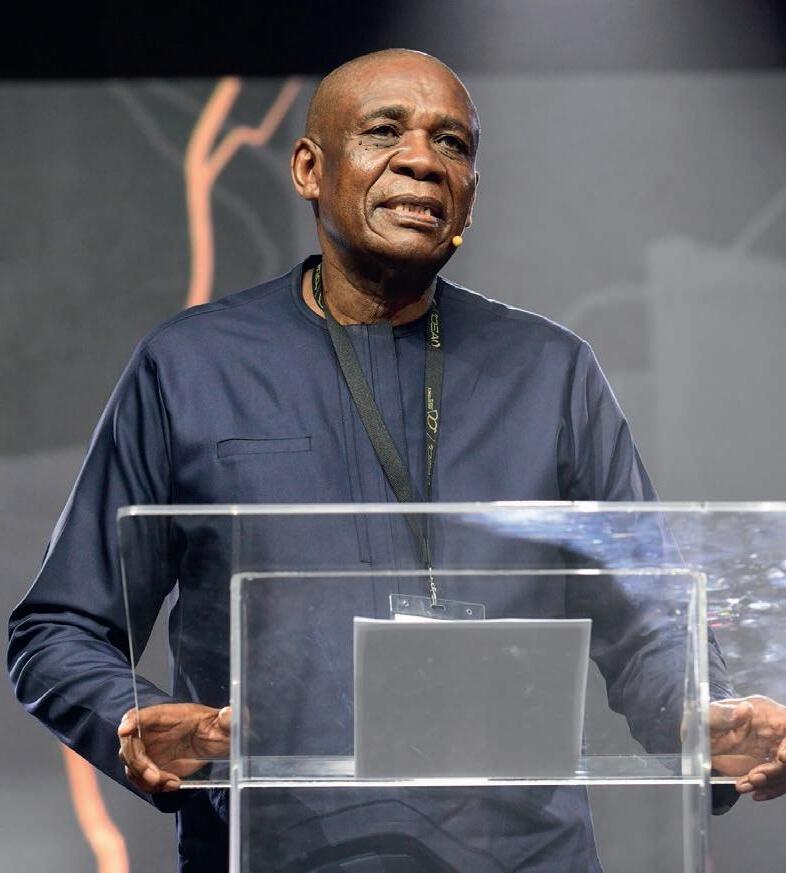
Both ESG and transformation are about sustainability. Both concepts are centred on justice, encompassing environmental justice, economic justice and intergenerational justice.
The AECI story is deeply entwined with South Africa’s industrial development. However, like many large corporations born during apartheid, we inherited a system that excluded and marginalised, often by design. To speak honestly about transformation, we must acknowledge this history and the structural inequities it created. And then we must act.
As early as the 1970s, AECI began doing just that, recognising that our long-term growth would be inextricably tied to the wellbeing of our people and the upliftment of our communities. From allocating a portion of pro ts to social development, under the pioneering “Quality of Life” budget, to enabling artisan training and supporting black education before it was legislated, we made a radical choice for its time: to lead with conscience.
Decades later, we nd ourselves at a similar crossroads, only this time, the stakes are planetary and the timeline perilously short.
We are in the decisive decade for climate action. At the same time, we remain a country (and a continent) burdened by structural unemployment, inequality and economic exclusion. So, we must ask: what does it mean to be a sustainable company today?
My answer: it means being unafraid to imagine and implement new models of inclusive capitalism. It means using ESG not as a box-ticking exercise, but as a blueprint for long-term, just and equitable growth.
The “E” in ESG receives the most attention. Rightly so. But the “S”, the social, is often the most underdeveloped. For AECI, the “S” is personal. It lives in the communities surrounding our sites. It breathes in our partnerships with schools and clinics, with farmers and foundations, with educators and early childhood programmes. It speaks in every language of dignity: food security, access to water, learning outcomes and opportunities.
In 2023 alone, AECI reached 1.4 million bene ciaries through
Unless we actively design for inclusivity, we risk entrenching a new kind of inequality where sustainability becomes the preserve of the privileged.
targeted programmes that improved education, created jobs, enabled solar and water infrastructure and promoted self-suf ciency in rural and peri-urban communities.
However, numbers alone don’t tell the full story. At the core of our strategy is a shift from charity to capability. We do not invest to feel good. We invest in building ecosystems of knowledge, resilience, entrepreneurship and future-readiness. This is transformation in its truest sense.
Governing ethically is not new to AECI. From supply chain transparency to community grievance mechanisms, our governance frameworks have matured into systems that prioritise long-term sustainability over short-term performance.
However, governance is also about courage. About the willingness to call out inequity and challenge a culture of silence. It is why I have spoken openly about the need for businesses to confront corruption and injustice, not with cautious detachment, but with principled engagement.
If ESG is to be anything more than jargon, governance must lead with moral clarity.
The green economy is being heralded as the next frontier of growth. Hydrogen. Electric vehicles. Circular production. Regenerative agriculture. These are not just trends; they are transformational shifts. However, unless we actively design for inclusivity, we risk entrenching a new kind of inequality where sustainability becomes the preserve of the privileged.
South Africa cannot afford a green economy that replicates the patterns of the past. We must ensure that the jobs created are accessible to young black South Africans. The training required is made available in rural schools. Local suppliers are equipped to participate in emerging green value chains. Those
women, who are often the backbone of community development, must be at the table; not just in support roles.
Inclusive sustainability must ask: Who bene ts? Who is left out? And how can we design differently?
I leave this role with great pride in what we have achieved, but also with a clear-eyed view of what remains to be done. I urge our next generation of leaders to rede ne what success means. Yes, pursue growth. Yes, deliver shareholder returns. However, don’t ever forget that pro t is a byproduct of purpose, not the other way around.
I am proud that AECI’s new chairperson, Philisiwe Sibiya, brings her business acumen as well as a deep understanding of the need for systemic inclusion. I know she will carry forward our legacy with vision and vigilance. I am equally con dent in the teams that make up this great company; men and women whose commitment to excellence, equity and innovation continues to inspire me.
In closing, I offer this nal thought: we often speak of “leaving the world better than we found it.” But perhaps the truer question is, whose world are we bettering?
Sustainability must mean more than carbon credits and climate pledges. It must mean social repair. Economic inclusion and moral imagination. If ESG is our roadmap, then transformation is the compass. Together, they point us not just to a greener future, but a fairer one.
AECI’s next 100 years will be shaped by who we empower to build with us. Let us choose wisely. Let us lead boldly and never let us forget: our legacy is not a monument. It is a movement toward justice, possibility and a truly inclusive future.
Follow: Dr Khotso Mokhele @ www.linkedin.com/in/khotso-mokhele-3b46b58a
South Africa’s brightest minds gathered to reimagine black economic empowerment at the 2024 BMF Policy Conference and Achievement Awards, a de ning moment for transformation and inclusion
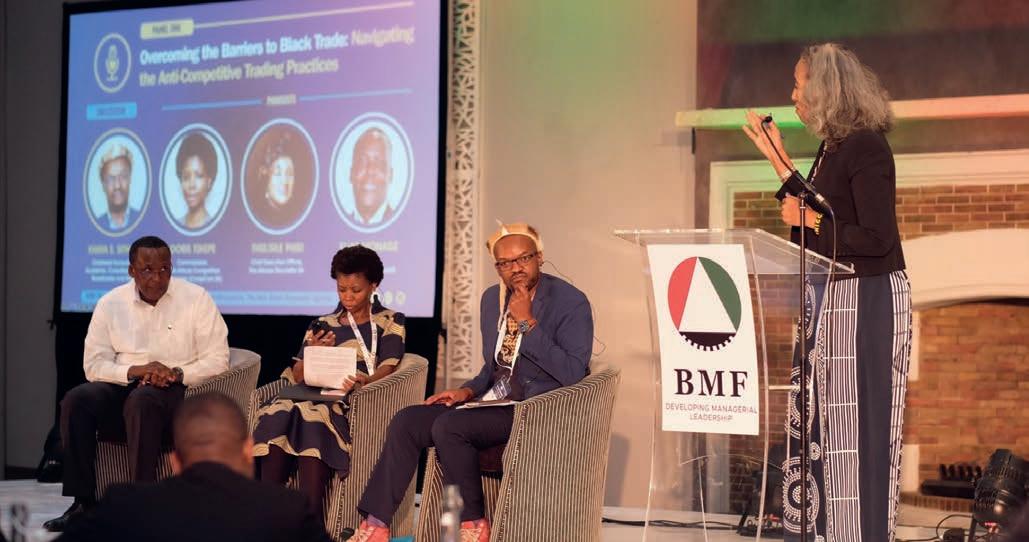
On 8 November 2024, the Black Management Forum hosted its pivotal Policy Conference and glittering Achievement Awards Gala Dinner across two prestigious Johannesburg venues: the Protea Hotel Wanderers and the Sandton Convention Centre. With the theme “Accelerating Social Transformation: The New Black Economic Agenda,” the gathering served as a powerful convergence of leadership, insight and resolve.
The daytime Policy Conference unpacked South Africa’s economic realities and reimagined solutions for genuine transformation. Five high-impact panel sessions explored topics ranging from dismantling structural trade barriers
and strengthening broad-based black economic empowerment enforcement to unlocking global markets and addressing the corporatisation of state-owned enterprises.
Noteworthy contributors included Deputy Minister Phumzile Mgcina and South African Competition Commissioner Doris Tshepe, along with leading policy voices and corporate decision-makers. The tone was direct: cosmetic compliance is no longer acceptable. What emerged was a uni ed call for bold accountability, deliberate inclusivity and accelerated execution.
As night fell, attention turned to celebration at the Awards Gala Dinner,
a tribute to individuals and organisations transforming South Africa from within. Vuyiswa Tlomatsane (Manager of the Year), Lufuno Rasoesoe (Woman Leader of the Year) and Lilitha Mahlathi (Young Professional of the Year) were among those honoured for visionary leadership and societal impact. Business trailblazers Even Bow and Ivili Loboya were recognised for inclusive enterprise models, while Old Mutual received the Social Impact Corporate Award for advancing nancial inclusion. A heartfelt lifetime tribute was paid to Sally Cindi, a matriarch of the BMF community whose legacy continues to inspire quiet leadership and enduring service.
At the Premier Business Lounge, rural innovation met corporate ambition in a celebration of culture, leadership and entrepreneurship curated by the BMF Young Professionals
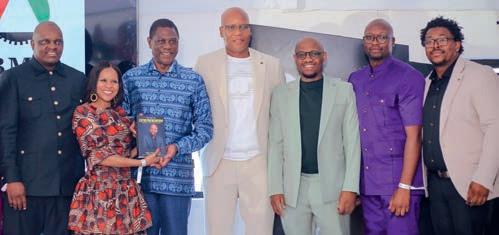
Set against the electric atmosphere of the Berlin November horse racing festival in the Eastern Cape, the BMF Young Professionals’ Premier Business Lounge offered more than just
a year-end celebration; it was a deliberate fusion of tradition, strategy and empowerment.
The event provided a high-calibre networking space for executives, young leaders and creatives who are rede ning South Africa’s entrepreneurial future. Deputy President Paul Mashatile and Eastern Cape Premier Oscar Mabuyane lent gravitas to the occasion with powerful keynotes.
A standout moment was the “Business Hour Chat,” themed “From Hustle to Strategy,” which also served as the of cial launch of Lebo Gunguluza’s book, The Art of Entrepreneurship.
The lounge modelled what transformation looks like when it is grounded in community and elevated by opportunity, af rming the BMF Young Professionals’ commitment to raising a generation of leaders who see heritage as an asset, not a hindrance.
The 2024 George Negota Lecture paid tribute to a legal icon while framing transformation as a legal, ethical and leadership imperative in post-democratic South Africa
The George Negota Lecture on 5 December 2024 carried the weight of both remembrance and a rallying cry for Africa’s future. This year’s gathering – the fth edition – held an undeniable urgency: an insistence that true leadership looks forward, not backwards.
Mpho Makwana delivered the keynote message, cutting through nostalgia. “The future is the only place worth leading to,” he declared, urging attendees to escape the trap of romanticising the past. Time spent longing for “how things used to be” is time lost from shaping what must come. His challenge echoed through the hall: our collective destiny awaits tomorrow, not yesterday. He called on emerging and established leaders to anchor their ambitions in forward motion – economic agency, governance and transformative aspiration.
The BMF president, Mpho Motsei, reminded the audience of the lecture’s deeper purpose: to honour the memory and ideals of former BMF president George Negota. It was Motsei’s voice that bridged the continuity of legacy with current urgency, af rming why the BMF celebrates Negota’s life annually: not to linger in remembrance, but to draw from his legacy as fuel for renewed ethical leadership.
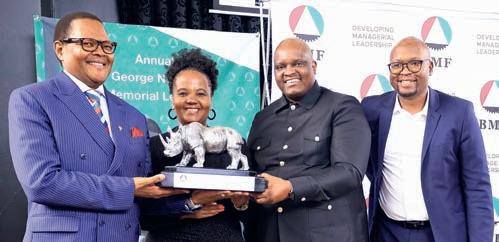
Tension was at the heart of the evening: the need to remember and the demand to evolve. Makwana’s address made clear that commemoration without action risks inertia. As he urged: “The place we will spend most of our lives is the future” –this is where purpose must dwell.
This lecture did not recede into solemn tribute; it moved forward with a clarion call: to rebuild with intention, to lead with vision, to embody Pan-African progress. The legacy of George Negota lives on not as a museum piece, but as a ame kindled by renewed leadership that steps boldly into tomorrow.
The BMF hosted an evening of deep re ection, launching two seminal leadership texts that rede ned ethics, legacy and Ubuntu in today’s governance discourse
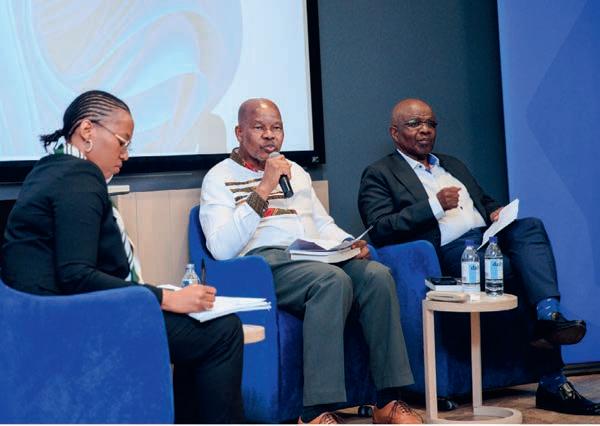
On 28 November 2024, the BMF convened a profound leadership dialogue at the Sanlam Auditorium in Sandton. The theme, “The Higher Purpose: Rethinking Leadership and the African Ethos,” framed the dual book launch of two living legends: Dr Reuel J Khoza (The Spirit of Leadership) and Professor Wiseman Nkuhlu (A Life of Purpose).
Dr Khoza’s remarks recentred African leadership on spirituality, Ubuntu and moral responsibility. Professor Nkuhlu spoke on the urgent need for principled, purposeful leadership grounded in justice, not convenience. Their exchange was not just literary; it was an intergenerational handover of values and responsibility.
Audience interaction revealed a hunger for leadership that transcends the super cial and centres the soul of a nation. It was a de ning moment in the BMF’s journey to shape leaders who lead not only with vision, but also with virtue.
In a gripping Post-SONA Dialogue, the BMF tackled South Africa’s economic fragility and leadership vacuum, demanding transformation with substance, strategy and sovereign focus
On 11 February 2025, the BMF, in partnership with Henley Business School and AlexForbes, hosted the 2025 Post-SONA Dialogue, an un inching exploration of South Africa’s volatile political and economic landscape. Framed around President Ramaphosa’s State of the Nation Address, the event posed a hard-hitting question: are we navigating change or reacting to collapse?
Professor Bonang Mohale issued a clarion call: “We are at a reckoning.” With SONA lacking a coalition governance blueprint, the dialogue spotlighted risks of political instability. Economist Mpho Molopyane outlined looming threats, from uncertain AGOA and PEPFAR renewals to global investor hesitation.
Dr Rutendo Hwindingwi reinforced the warning, urging regional trade diversi cation and strategic sovereignty.
Speakers agreed: transformation cannot wait for stability. It must be the path to it. As one panellist concluded: “SONA is the story. The budget is the strategy.”
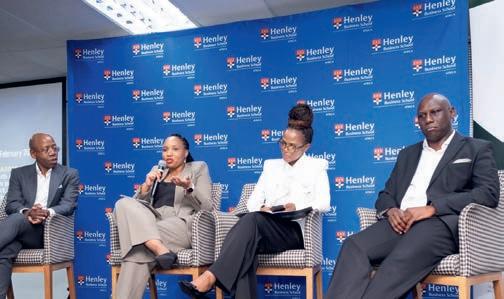
Despite progressive legislation aimed at empowering women, leadership roles remain elusive for many, especially in asset management, writes SNE DLAMINI, head of institutional business at Old Mutual Investment Group
The Broad-Based Black Economic Empowerment (B-BBEE) Act, along with the Codes of Good Practice, have contributed immensely to promoting and empowering women in South Africa, however, much work is still needed. Women continue to be sidelined in boardrooms and not considered for key leadership roles, especially in asset management.
However, gender-lens investing is starting to gain traction and could be key in guiding “captains of industry” to deliver on gender agenda commitments. This involves the deliberate allocation of capital to companies that actively promote women’s empowerment, recognising that such investments can generate competitive nancial returns while contributing to a more equitable and inclusive society.
The key impacts of gender-lens investing unpacked:
1.Investing in women-owned or women-led enterprises to empower women economically, foster job creation and economic growth.
2. Promoting workplace equity through investment in companies committed to gender equity in staf ng, management, board representation and supply chains.
3. Investing in gender-positive products and services that improve the lives of women and girls in healthcare, education, safety and nancial inclusion.
4. In uencing corporate behaviour by signalling that gender equality is a crucial aspect of good business practice.
5. Driving nancial performance, as companies with diverse management teams often show stronger results.
6. Addressing systemic inequalities by dismantling barriers to women’s economic empowerment and progress.
Within South Africa’s nancial services landscape, the principles of gender-lens investing hold particular signi cance. Given the nation’s complex history and the need to address systemic inequalities, integrating a gender perspective into investment strategies presents a compelling opportunity for social and economic transformation.
Global initiatives such as the 2X Challenge, led by development nance institutions and international nancial Institutions, have encouraged private market investors to adopt gender-lens investing in Africa and other emerging markets. While adoption is growing, gender-lens investing has yet to become mainstream – a practice desperately needed to address century-old scars.
True transformation lies in reshaping workplace culture and dismantling societal constraints that unfairly burden women. Fit-for-purpose policies must challenge cultural norms, rede ne gender roles and support women’s aspirations beyond the boardroom.
The 2024 Just Share report on women in leadership found that women hold 36 per cent of board positions among JSE Top 40 companies, but only 23 per cent of executive management roles. While board representation has modestly increased, the proportion of women in top operational and strategic positions has declined.
In asset management, under-representation is even more pronounced. Women make up just 17.2 per cent of portfolio management professionals in South Africa, according to the 2023 EPPF Diversity in Asset

Management research. Most occupy analyst roles, and systemic barriers to advancement remain. The discrepancy between the 46 per cent of women in South Africa’s economically active population and their representation in leadership underscores a substantial untapped talent pool.
It’s time for asset owners and stakeholders to probe gender issues in South Africa.
Old Mutual Investment Group is the leading South African large asset manager on diversity, equity and inclusion (DEI), according to the 27Four DEInvest Survey 2024. Internally, 32 per cent of the company is women-owned, with 50 per cent board representation and 31 per cent of investment professionals being women. Externally, funds such as the Old Mutual Global ESG Equity Portfolio and the Old Mutual African Frontiers Fund employ a gender lens, prioritising companies with signi cant women leadership at the board level to foster both nancial returns and community upliftment.
The journey ahead requires conviction and intent, but we stand rm in charting the path for gender equality in our industry
